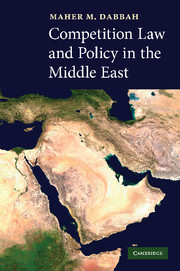Book contents
- Frontmatter
- Contents
- Preface
- List of abbreviations
- 1 Introduction
- 2 The relationship between Islam and competition law and policy
- 3 Israel: the region's oldest competition law
- 4 Turkey: a European dream from the other side of the border
- 5 The Arab Maghreb countries
- 6 Jordan's 2004 Competition Law
- 7 The Gulf States: a possible model for regional cooperation
- 8 The Arab Republic of Egypt: the chase after globalisation
- 9 Lebanon and Syria: a tale of two states
- 10 Conclusions
- Index
8 - The Arab Republic of Egypt: the chase after globalisation
Published online by Cambridge University Press: 20 July 2009
- Frontmatter
- Contents
- Preface
- List of abbreviations
- 1 Introduction
- 2 The relationship between Islam and competition law and policy
- 3 Israel: the region's oldest competition law
- 4 Turkey: a European dream from the other side of the border
- 5 The Arab Maghreb countries
- 6 Jordan's 2004 Competition Law
- 7 The Gulf States: a possible model for regional cooperation
- 8 The Arab Republic of Egypt: the chase after globalisation
- 9 Lebanon and Syria: a tale of two states
- 10 Conclusions
- Index
Summary
In recent years, the Arab Republic of Egypt has witnessed dramatic political and economic developments, which have placed the country on its course towards transformation. At times the Republic – which embraced socialist thinking and ideology following the revolution in 1952 – appears uncomfortable with these changes, however, mainly due to the fact that many of them have been imposed from the outside, quite often without the necessary preliminary preparatory steps being taken by the government, rather than ones that have come to grow gradually from domestic roots. Among these changes are the increasing pressure applied by the US government as part of its agenda of ‘democratising’ the Middle East; the conflicts in Iraq and neighbouring Israel and Palestine; and the Darfur crisis in Sudan. However, internal factors have stirred this state of play as well, notably the agenda for changing the political system in the Republic and the way in which the President is elected; inadequate protection of human rights; and the apparent growing influence of Islamists and the Muslim Brotherhood.
Economically, the government's agenda during the last two years has been dominated to a large extent by a strong drive towards implementing its privatisation programme. This drive dates back to the 1991 Economic Reform and Structural Adjustment Programme created with the help and support of the International Monetary Fund (IMF) and the World Bank.
- Type
- Chapter
- Information
- Competition Law and Policy in the Middle East , pp. 237 - 260Publisher: Cambridge University PressPrint publication year: 2007



